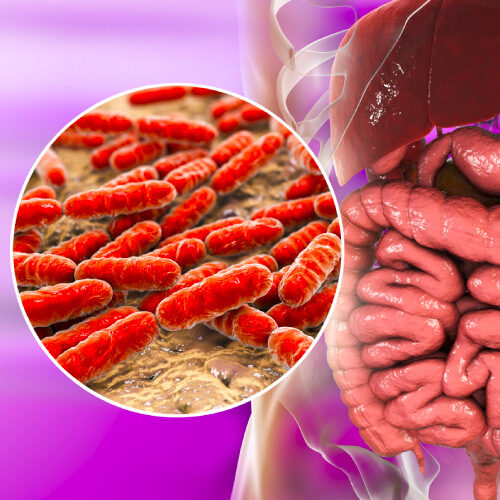Gut And Digestive Health Treatment In San Diego
Gut function directly impacts physical, emotional, and mental health. Symptoms like diarrhea, constipation, flatulence, abdominal pain or tenderness, and heartburn can all be signs that something is off in the gut. If you are experiencing any of these symptoms, continue to learn more below.

What causes an unhealthy gut?
An unhealthy gut can be attributed to a variety of factors. Antibiotics, which can wipe out beneficial bacteria, can greatly increase the risk of gastrointestinal disorders. A diet low in fiber, such as the Standard American Diet, can also cause problems since fiber is essential for a healthy gut. Additionally, long-term stress and its associated hormonal impact may damage the GI tract, increasing the likelihood of an unhealthy gut.

Why a healthy gut is important?
Digestive problems have huge effects on many aspects of health including the following:Gut health and sleep
It’s well known that gut health is closely linked to sleep. Recent studies have suggested that the gut plays a pivotal role in regulating the sleep-wake cycle. An unbalanced internal ecology can lead to insomnia and other disruptions in sleeping patterns.Immune and gut health
Roughly 70% of the immune system is located in the gut. When it’s out of whack, this can affect immunity. The gut is home to billions of bacteria, many of which help guard against disease and aid in overall well being. If these bacteria are disrupted, it can lead to a range of issues such as autoimmune diseases, allergies, and gastrointestinal disorders.Gut health and mood
The gut is often referred to as the second brain. It and the brain are connected via the vagus nerve, which facilitates communication between the two organs. An imbalanced gut has been linked to depression, anxiety, and other mental health issues. Additionally, an unhealthy GI tract can negatively affect neurotransmitter production such as serotonin, which plays a key role in mood regulation.
Concentration and gut health
Numerous studies have shown a correlation between gut health and brain function. The connection between the two is known as the gut-brain axis, which is linked to cognitive function, stress levels, and mood. One theory suggests that certain bacteria in the gut are responsible for producing neurotransmitters that impact how the brain works – such as dopamine, which is involved in focus and concentration.

Skin and gut health
Gut health can have a major influence on skin health. Certain microorganisms in the gut lead to inflammation, leading to conditions like acne, eczema, psoriasis, and more.
The microbiome also plays a role in immune function – if balance or regulation is impaired, inflammation and skin infections can occur. Additionally, managing stress levels is important for maintaining your gut-skin connection.

Conditions associated with an unhealthy gut
Dysbiosis
Gut dysbiosis occurs when an imbalance of bacteria exists in the intestines.
This can be responsible for a range of health issues, from nutrient deficiencies to inflammation and digestive disorders. Signs of this include bad breath, bloating, constipation, diarrhea, and abdominal pain.
Diagnosing dysbiosis starts with your doctor reviewing your medical history, looking for any associated symptoms, and ordering tests such as the comprehensive digestive stool analysis (CDSA).
This test can detect bacterial imbalance or overgrowth in the gut, providing more information on any potential issues.
Symptoms of SIBO, a digestive disorder caused by an imbalance in the bacteria in the intestine, include abdominal pain, gas, bloating, constipation, and diarrhea.
It is also a common cause of irritable bowel syndrome (IBS). Diagnosis can be difficult but is essential for catching this issue early. Unfortunately, many people suffer from SIBO (Small Intestine Bacterial Overgrowth) for years without their doctors being aware of it.
If you suspect you might have this condition, don’t hesitate to speak with your doctor about it.

Leaky gut
Contact between the intestinal walls and inflammatory foods, toxins, or metabolites from bacteria and fungi can damage cells lining the gut.
These cells form a barrier between the GI tract and bloodstream to keep larger proteins and toxins from entering the body. When tight junctions become impaired, this causes the barrier to be leaky, allowing proteins from the digestive system to escape into the bloodstream.
This can lead to an immune response against these escaped proteins causing food allergies, autoimmune diseases, chronic inflammation, or neurological disorders.
Inflammatory bowel disease
IBD is a chronic inflammation of the digestive system that encompasses Crohn’s disease and ulcerative colitis. Symptoms of this condition include diarrhea, abdominal pain, weight loss, and blood in the stool.
Often, IBD is caused by a combination of genetic and environmental factors. The Standard American Diet with its lack of fiber and over-refined foods can lead to dysbiosis which may worsen symptoms.
It is essential to seek medical attention from a health care provider experienced in treating digestive disorders when dealing with IBD as it is a serious condition.

Gastroesophageal reflux disease (GERD)
Heartburn, acid reflux and GERD are common conditions that affect many people in the United States. The symptoms of GERD can be worse when lying down, leading to discomfort and distress. Fortunately, there are a variety of ways to manage and treat this condition. If you think you may be suffering from GERD, it is important to talk to your doctor for advice and support.
Naturopathic approach to gut health
As naturopathic and functional medicine doctors, we often follow what is known as the 5 R protocol when addressing gut conditions:

- Remove: any infections, bacterial or fungal overgrowth, food
sensitivities, or allergies that could be causing or worsening the
condition - Replace: digestive enzymes or stomach acid that needs to be added to support healthy digestion.
- Repair: repair the GI lining which is often compromised in gut conditions, using supplements and herbs.
- Re-inoculate: add back any beneficial bacteria that is deficient in the digestive tract.
- Rebalance: rebalance the patient’s life in order to maintain this new gut healthy way of life.
Naturopathic doctors will emphasize the importance of testing to determine the cause of any given condition. This means testing blood for food sensitivities and allergies, conducting a comprehensive stool analysis to look for yeast or bacterial overgrowth, and examining digestive and absorption markers.
Results from these tests will be used to build you an individualized treatment plan following the 5 R principle.
